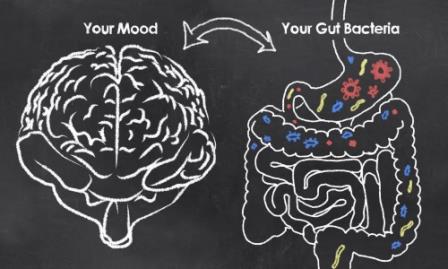
Nutrition plays an under-recognized role in the treatment of mental health. The connection between gut health and brain health is beginning to be understood as a bilateral connection. Similar to how we feel sick to our stomachs when we are nervous or scared, our stomachaches can equally affect our moods, behaviors and thoughts. Sufficient evidence is beginning to show the influence a healthy digestive system can have on the way the brain processes behaviors related to stress, mood, pain and cognitions in conditions such as depression, obsessive compulsive disorder and anxiety.
How your unhealthy gut may be contributing to your mental health disorders.
An unhealthy gut can result in malabsorption of essential nutrients your body needs to function mentally and physiologically. Symptoms such as excessive gas, bloating, cramping, nausea, diarrhea, constipation, indigestion and abdominal pain can be indications of a digestive disorder. A few examples of gut disorders are irritable bowel syndrome, celiac disease, food intolerances and unhealthy intestinal microbial composition. If you’re experiencing these symptoms, it is likely you are not fully absorbing the micronutrients (vitamins and minerals) and macronutrients (protein, fat and carbohydrates) your body needs to maintain good mental, nervous system, bone, skin, blood, circulatory and immune health.
A healthy gut produces the body’s correct amount of serotonin. Serotonin is a neurotransmitter that regulates your sleep and appetite, mediates moods and inhibits pain. About 90% of your serotonin is produced in a healthy gastrointestinal tract. Therefore a healthy digestive tract not only digests food properly, but also guides your emotions.
The function of the nerve cells and production of neurotransmitters that run between your gut and brain are dependent on the “good” bacteria that make up your intestinal microbiome. The gastrointestinal tract is lined with a hundred million nerve cells that interact with your brain. The “good” bacteria maintains the health of these nerve cells by protecting the lining of your intestines, providing a strong barrier against toxins, limiting inflammation, improving how well you absorb nutrients from your food and activating neural pathways that travel directly between the gut and brain.
Things you can do to improve your digestive tract health.
Get to the source of what’s irritating your stomach. If you are experiencing excessive gas, bloating, cramping, nausea, diarrhea, constipation, indigestion and abdominal pain, know this is not normal at any age and should be addressed. A registered dietitian can help you get to the root cause of your stomach issues and begin a process of healing. Once you begin healing the lining of your digestive tract the better you’re able to absorb the nutrients your body needs for optimal functioning.
Eat Probiotics. Probiotics are the “good” bacteria you need to keep your digestive tract healthy. Probiotics ease digestion, promote regularity and aid in breaking down nutrients. Try to incorporate a minimum of one probiotic food in your diet a day. Foods such as unpasteurized kimchi, miso, sauerkraut, kombucha, kefir, yogurt, aged cheese, cultured butter, cultured milk, cultured creams and other fermented fruits and vegetables are excellent sources of probiotics. Be sure the label reads live and active cultures to ensure you are getting a quality product.
Eat Prebiotics and a diverse healthy diet. Prebiotics are dietary fibers found in fruits, vegetables, legumes, whole grains, nuts and seeds that feed the “good” bacteria in your gut. Try to include at least five grams of prebiotic foods in your diet a day for improved gut health.
Reduce overuse of antibiotics. Antibiotics are sometimes essential for killing off bacterial infections. However, antibiotics not only attack the “bad” bacteria in the body but also the “good” bacteria. When you have to take antibiotics, have a prebiotic meal plan and probiotic supplement regimen to get you through the antibiotic time period. Be sure to consult with your doctor before beginning a probiotic supplement regimen. Those with certain cancers or autoimmune disorders may have a negative reaction to probiotic supplementation.
Please note that if your symptoms worsen or do not improve after incorporating probiotics and prebiotics in your diet, it’s important to seek help from a registered dietitian or your doctor. Everybody’s system is different. Find what works for you.
Kim Johnson RD
Kim Johnson RD is the registered dietitian at the nCenter.

